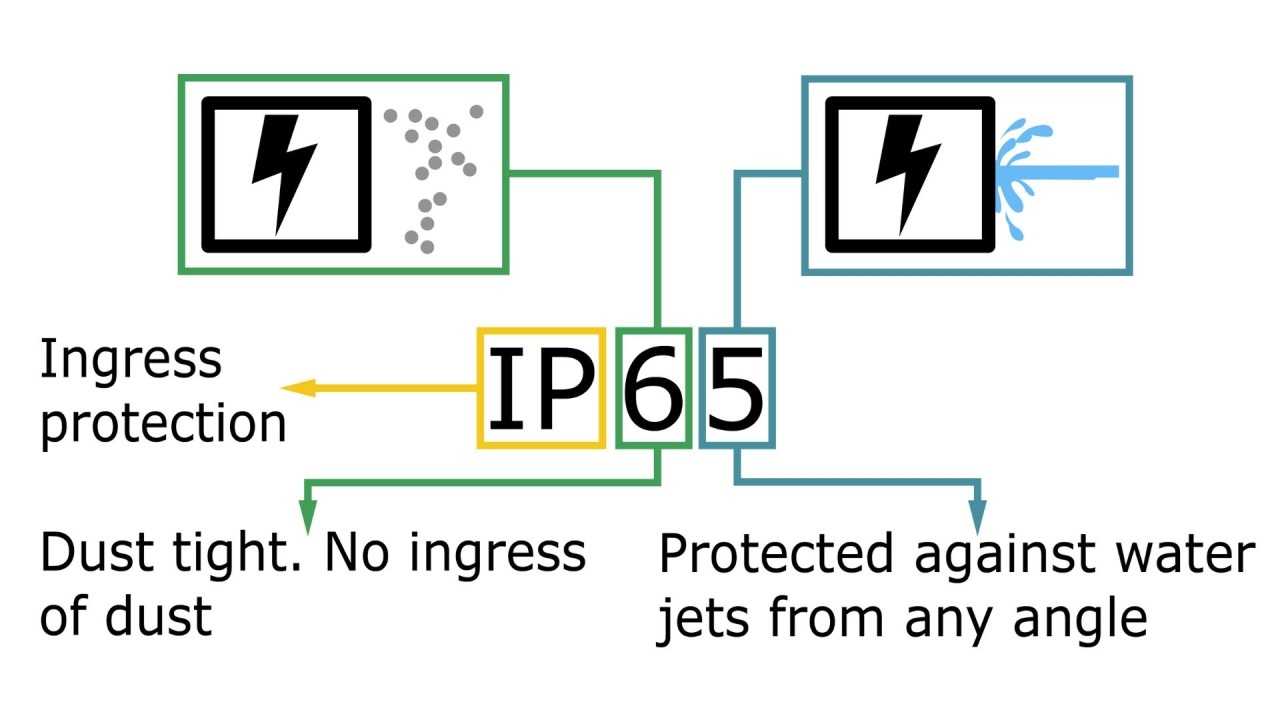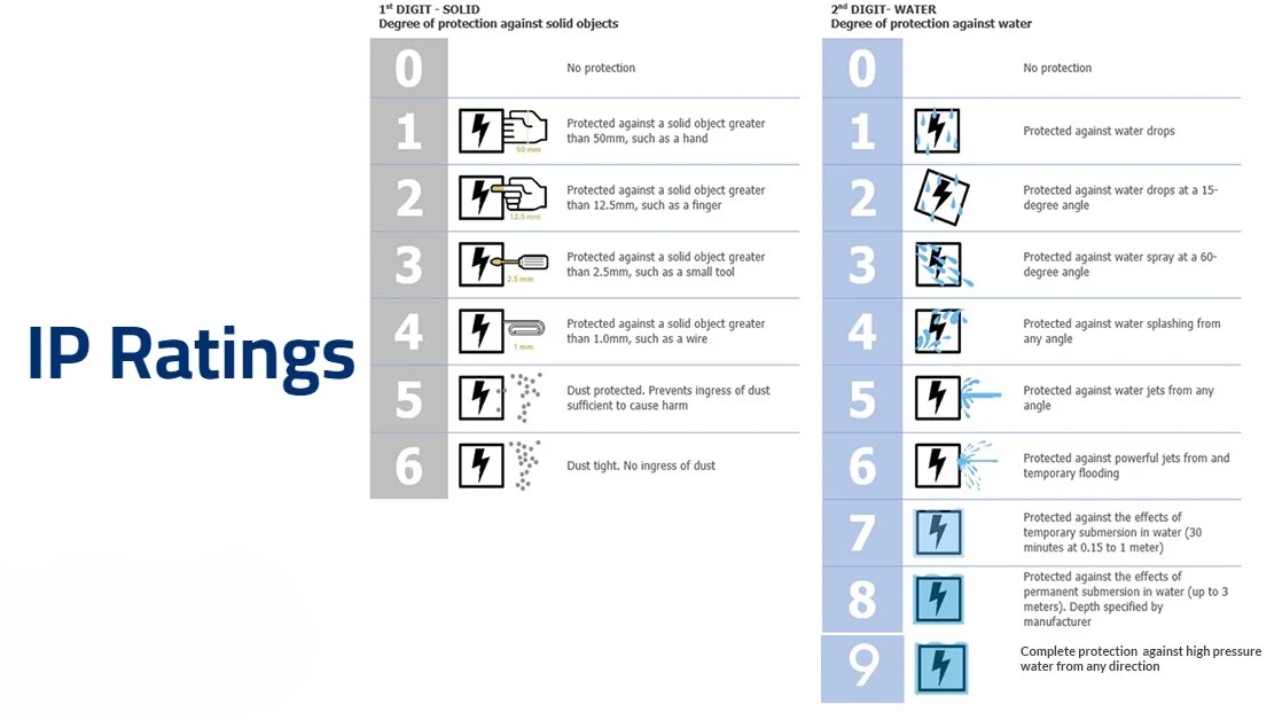You should have seen terms like IP65 and IP66 while shopping for electrical enclosures, industrial equipment, etc. These ratings help in classifying the protection level that electrical enclosures provide against water, dust, as well as other environmental features. However, what are these ratings, and what differentiates them. Let’s find out.
What is IP65 Rating?

IP65 ratings describe the level of dust and water protection a device offers. When a device has this rating, it means that it has complete protection against dust and can withstand low-pressure water jets.
The figure “6” in this rating symbolizes total protection from dust while the figure “5” describes water resistance. IP65 rating doesn’t mean complete waterproofing, but it ensures a good level of water resistance. You will find this rating on outdoor lighting and industrial equipment.
What is IP66 Rating?

IP66 rating describes complete protection against dust and strong water jets. Devices with this rating have the ability to tolerate unfavorable environmental conditions like rain and wind. Lighting fixtures, industrial equipment, and electrical enclosures used in outdoor settings usually come with IP66 rating. However, these devices can’t withstand water immersion.
IP65 vs IP66: What are the Differences?

Although IP65 and IP66 ratings both offer protection against dust and water jets, their protection level differs. Also, these two NEMA ratings differ in some other aspects which we will be explaining below. Knowing the differences between these ratings helps you to make informed decisions. Let’s take a look at their differences in various aspects.
Water Protection
IP65 and IP66 ratings are both dustproof. This means they prevent dust from getting through a device. While they offer a good level of dust protection, their water protection level differs. IP65 ratings can resist low-pressure water jets like rain and splashes. This water protection level is suitable for outdoor lighting and electrical enclosures where there is minimal exposure to water. These devices rarely come in contact with moisture.
IP66 rating has higher water resistance compared to IP65. Devices with IP66 ratings are ideal in applications where there is more exposure to strong water jets like industrial washdowns. These devices can tolerate high-pressure water. Although IP66 rating can’t resist submersion, it offers enhanced protection against high water exposure.
Applications
IP65 rating offers protection against low water pressure such as light rain, hose spray, and splashes. Therefore, devices with this rating are ideal for use in an application environment where there is minimal exposure to intense water. This makes them perfect for your electrical enclosure, lighting fixtures, and surveillance system. In such areas, you only need to protect your device against normal weather conditions
IP66-rated devices are useful in an environment exposed to intense water contact or frequent washdown. In such an environment, it is important to protect devices against water penetration. IP66-rated devices can handle unfavorable conditions like high moisture and strong wind. This rating is more ideal in settings that require durability.
Outdoor Suitability
While you can use IP65 and IP66-rated devices for outdoor settings, you need to consider the environmental conditions you will be subjecting your device to.
IP65 ratings are suitable for outdoor settings (commercial or residential) where there is minimal exposure to dust and water. For instance, common devices like outdoor cameras, streetlights, electrical boxes, and patio lights are mostly IP65-rated. These devices don’t usually come in contact with high levels of moisture.
On the other hand, IP66 rating provides protection against harsh weather conditions. Devices with such ratings are great for marine, and industrial applications. In these applications, there is frequent exposure to heavy storms and strong water jets. Also, these devices can survive weather fluctuations.
Durability
IP65 and IP66-rated devices are both durable, but they offer different levels of durability. IP65 devices are built with high-quality materials that enable them to tolerate unfavorable weather conditions like moisture, dust particles, and dirt.
Meanwhile IP66-rated devices are more durable as they can tolerate extreme weather conditions without wearing out. Although IP65 protects against occurrences like dust storms, snow, and rain, they can wear out due to constant exposure to harsher conditions.
IP66-rated devices, on the other hand, can resist saltwater spray and frequent washing. This makes them a more durable option compared to IP65. Therefore, IP66 is a better choice for areas prone to storms, extreme temperature, and high winds.
Material Composition
IP65 and IP66-rated devices both differ in terms of the material used for their construction. IP65 rating only offers protection against dust and low-pressure water jets. While IP66-rating also provides such protection, it can. Withstand harsher weather conditions and high moisture exposure. This is because of the quality of the material used in producing devices with this rating. IP66-rated products feature higher-quality materials compared to IP65 rated devices.
Cost
This is another factor that differentiates IP65 from IP66 rating. Due to the level of protection each rating offers, their cost differs. In general, IP65-rated devices are not as expensive as IP66-rated products since they only offer a limited level of protection against dust and water. IP65 ratings are a common option in applications that don’t require resistance to high-pressure water. Therefore, you can use them for commercial and residential settings, if you are working with a tight budget.
However, IP66-rated devices are costlier since they are more durable and have better resistance. Also, these devices usually have enhanced sealing and the materials used for their construction are high-quality. These materials aren’t only dustproof and waterproof, they also have weather -resistant properties. Therefore IP66-rated products can resist high-pressure water jets and harsh conditions.
Conclusion

IP65 vs IP66 ratings are both worth considering for dustproof and waterproof purposes. However, each of these ratings has a different level of protection against water and dust. The environmental condition of your application is a factor that helps you decide the suitable rating for your device.
For great performance and durability, it is important you choose a suitable IP rating from a reputable manufacturer that meets your application requirement. We hope this article helps you make an informed decision.



